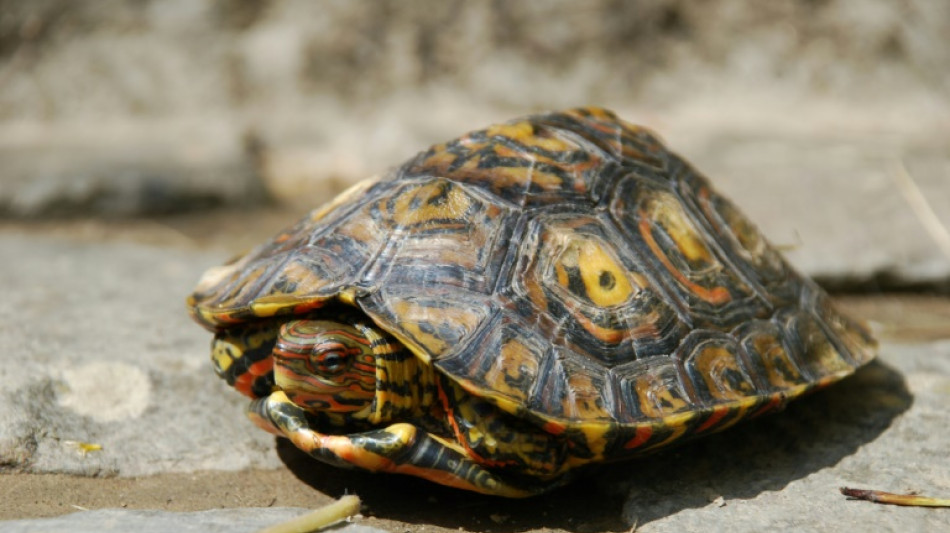
-
 Three in a row Piastri wins in Miami to lead McLaren one-two
Three in a row Piastri wins in Miami to lead McLaren one-two
-
Scheffler ties 72-hole PGA record in CJ Cup Byron Nelson romp

-
 Nicaragua says quitting UNESCO over press prize award
Nicaragua says quitting UNESCO over press prize award
-
Oscar Piastri wins Miami Grand Prix to lead McLaren one-two

-
 Bednarek runs this year's world-best 200m to win at Miami Grand Slam
Bednarek runs this year's world-best 200m to win at Miami Grand Slam
-
'Lucky number seven' for Ruud after beating Draper to clinch Madrid Open

-
 China's Zhao leads Williams 11-6 in world snooker final
China's Zhao leads Williams 11-6 in world snooker final
-
Far-right candidate tops Romania's presidential rerun

-
 Ryu takes wire-to-wire win at LPGA Black Desert Championship
Ryu takes wire-to-wire win at LPGA Black Desert Championship
-
Marseille held by fellow Champions League hopefuls Lille

-
 'Lonely' Palou cruises to win at IndyCar Alabama Grand Prix
'Lonely' Palou cruises to win at IndyCar Alabama Grand Prix
-
Zelensky says does 'not believe' Russian truce pledge

-
 US Fed expected to pause rate cuts again, await clarity on tariffs
US Fed expected to pause rate cuts again, await clarity on tariffs
-
Ruud beats Draper to win Madrid Open and claim maiden Masters

-
 Far-right candidate leads Romania's presidential rerun
Far-right candidate leads Romania's presidential rerun
-
Parag's six sixes in a row, Pant flops in IPL

-
 Howe hails Newcastle's 'ruthless' Isak after VAR drama in Brighton draw
Howe hails Newcastle's 'ruthless' Isak after VAR drama in Brighton draw
-
Pant woes continue as Lucknow lose to Punjab in IPL

-
 'Thunderbolts' strikes big, topping N.America box office
'Thunderbolts' strikes big, topping N.America box office
-
Kompany player-led shake-up returns Bayern to Bundesliga summit

-
 Leverkusen draw hands Kane's Bayern Bundesliga title
Leverkusen draw hands Kane's Bayern Bundesliga title
-
Chelsea sink champions Liverpool, Man Utd crash at Brentford

-
 Bielle-Biarrey lifts Bordeaux past Toulouse and into Champions Cup final
Bielle-Biarrey lifts Bordeaux past Toulouse and into Champions Cup final
-
Chelsea beat champions Liverpool to boost top five push

-
 Hammers' Potter reveals Paqueta's tears of frustration at Spurs draw
Hammers' Potter reveals Paqueta's tears of frustration at Spurs draw
-
Lyon's Champions League hopes hit by loss to Lens

-
 Israel vows retaliation against Iran, Yemen's Huthis over airport attack
Israel vows retaliation against Iran, Yemen's Huthis over airport attack
-
Man Utd 'need to change' after Brentford loss: Amorim

-
 China's Zhao dominates Williams 7-1 in first session of World Snooker final
China's Zhao dominates Williams 7-1 in first session of World Snooker final
-
Zelensky says does 'not believe' Russian truce promises

-
 Bielle-Biarrey double lifts Bordeaux past champions Toulouse and into Champions Cup final
Bielle-Biarrey double lifts Bordeaux past champions Toulouse and into Champions Cup final
-
Trump says 'I don't know' if must uphold US Constitution as president

-
 Brazil police foil Lady Gaga gig bomb plot
Brazil police foil Lady Gaga gig bomb plot
-
Godolphin in full bloom as Desert Flower wins 1000 Guineas

-
 Almeida wins Tour de Romandie as Evenepoel claims closing time-trial
Almeida wins Tour de Romandie as Evenepoel claims closing time-trial
-
Bolsonaro leaves hospital three weeks after abdominal surgery

-
 Man Utd crash at Brentford, Isak rescues Newcastle
Man Utd crash at Brentford, Isak rescues Newcastle
-
Romanians vote in tense presidential rerun as far right eyes win

-
 Lyon see off Racing to set up Challenge Cup final against Bath
Lyon see off Racing to set up Challenge Cup final against Bath
-
Kolkata survive Parag's six-hitting blitz to clinch IPL thriller

-
 Israel vows retaliation against Yemen's Huthis over airport attack
Israel vows retaliation against Yemen's Huthis over airport attack
-
Mbappe maintains Real Madrid Liga dream in Celta thriller

-
 UNESCO says Nicaragua quitting over press prize award
UNESCO says Nicaragua quitting over press prize award
-
Church donation box goes digital in Greece

-
 Germans mark liberation of Ravensbrueck Nazi camp
Germans mark liberation of Ravensbrueck Nazi camp
-
Missile hits Israel airport area in Huthi-claimed attack

-
 DeChambeau eyes PGA Championship battle after South Korea LIV win
DeChambeau eyes PGA Championship battle after South Korea LIV win
-
Chinese president to visit Russia on May 7-10: Kremlin

-
 'We don't care': weddings go on in Pakistan's Kashmir border
'We don't care': weddings go on in Pakistan's Kashmir border
-
Missile hits Israel airport area in attack claimed by Yemen's Huthis


Recordings show some 'mute' animals communicate vocally: study
More than 50 animal species previously thought to be mute actually communicate vocally, according to a study published on Tuesday which suggested the trait may have evolved in a common ancestor over 400 million years ago.
The lead author of the study, evolutionary biologist Gabriel Jorgewich-Cohen, told AFP he first had the idea of recording apparently mute species while researching turtles in Brazil's Amazon rainforest.
"When I went back home, I decided to start recording my own pets," Jorgewich-Cohen said. That included Homer, a turtle he has had since childhood.
To his great excitement, he discovered that Homer and his other pet turtles were making vocal sounds.
So he started recording other turtle species, sometimes using a hydrophone, a microphone for recording underwater.
"Every single species I recorded was producing sounds," said Jorgewich-Cohen, a researcher at Zurich University in Switzerland.
"Then we started questioning how many more animals that are normally considered mute produce sounds."
As well as 50 species of turtle, the study published in the journal Nature Communications also included recordings from three "very strange animals" considered mute, he said.
They include a type of lungfish, which has gills as well as lungs that allow it to survive on land, and a species of caecilian -- a group of amphibians resembling a cross between a snake and a worm.
The research team also recorded a rare type of reptile only found in New Zealand called a tuatara, the only surviving member of an order called Rhynchocephalia which once spanned the globe.
All the animals made vocal sounds such as clicks and chirps or tonal noises, even if they were not very loud or only made them a few times a day.
- Common vocal ancestor -
The research team combined their findings with data on the evolutionary history of acoustic communication for 1,800 other species.
They then used an analysis called "ancestral state reconstruction", which calculates the probability of a shared link back through time.
It had previously been thought that tetrapods -- four-limbed animals -- and lungfishes had evolved vocal communication separately.
"But now we show the opposite," Jorgewich-Cohen said. "They come from the same place".
"What we found is that the common ancestor of this group was already producing sounds, and communicating using those sounds intentionally," Jorgewich-Cohen.
The common ancestor lived at least 407 million years ago during the Palaeozoic era, the study said.
John Wiens -- an evolutionary biology professor at Arizona University in the United States who was not involved in the research -- said the suggestion that "acoustic communication arose in the common ancestor of lungfish and tetrapods is interesting and surprising".
Wiens, who published a 2020 paper called "the origins of acoustic communication in vertebrates", welcomed the new data for the additional species.
But he suggested the study might not "necessarily distinguish between animals making sounds and actual acoustic communication".
Jorgewich-Cohen said the researchers had indeed set out to identify sounds animals made specifically for communicating, by comparing video and audio recordings to find matches for particular behaviour.
They also recorded the animals in different groups "so we could tell if there are sounds that are only produced in specific situations", he said.
He acknowledged that some species were hard to study as they do not vocalise frequently and "tend to be shy", adding that further research was needed.
P.Costa--AMWN


